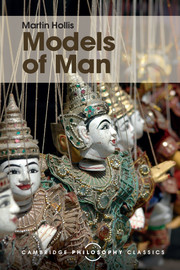4 - Life's short comedy
from Autonomous Man
Published online by Cambridge University Press: 05 November 2015
Summary
What is our life? The play of passion
Our mirth? The music of division:
Our mother's wombs the tiring-houses be,
Where we are dressed for life's short comedy.
The earth the stage; Heaven the spectator is,
Who sits and views whoso'er doth act amiss.
The graves which hide us from the scorching sun
Are like drawn curtains when the play is done.
Thus playing post we to our latest rest,
And then we die in earnest, not in jest.
Sir Walter RaleighWe are dressed in the womb for life's short comedy. Heaven, the spectator, sees more of the play than we ever could. Heaven sees both the man and the mask. Of course, Raleigh may be wrong. It may be that, if the actor could remove his last mask, there would be no face beneath. That, in a sense, was the moral of a passive conception of man. For, while there might (or might not) be homo psychologicus lurking behind homo sociologicus, neither offered an individual self of Raleigh's kind. There were analogues of everyday notions of self-identity and free action but they were analogues none the less. We come now to Autonomous Man and shall try to find him a frame of reference in the thin space between the inexplicable and the causally determined. It is the turn of the rational subject self to take the stage.
Most of us look askance at versions of the Social Contract, which explain social institutions as the (often unforeseen) results of pacts among fully-fledged pre-social individuals, already blessed with conscious goals and a language for planning how to achieve them. Even neo-Classical economics, which comes close in some ways, is careful to hedge itself with ceteris paribus clauses. Yet what I have just called everyday notions of self-identity and free action owe much to a classic social atomism. I do not think myself that enough space can be made for Autonomous Man, if we allow social facts so little importance in the analysis of human agency and so, before trying to understand the self, shall spend this chapter setting the social stage.
- Type
- Chapter
- Information
- Models of ManPhilosophical Thoughts on Social Action, pp. 56 - 70Publisher: Cambridge University PressPrint publication year: 2015

